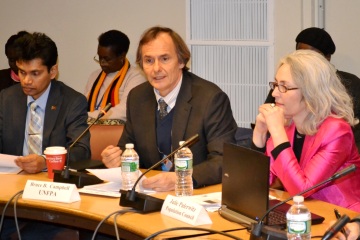News
Engaging Adolescent Boys and Young Men for Gender Equality
- 18 March 2014
News
UNITED NATIONS, New York – Adolescent boys and young men are critical allies in the battle for gender equality and must be proactively and positively engaged at an early stage. They can be educated to challenge gender stereotypes, promote positive constructions of masculinity, and practice attitudes and behaviours based on equality and respect for human rights.
This was the focus of discussions at a side-event hosted by UNFPA during the 58th session of the Commission on the Status of Women where experts engaged at the international, national, regional and community levels shared examples of successful initiatives and addressed the crucial role that adolescent boys and young men can play in achieving gender equality.
“Where do we want the 10 year-old boy or girl of today to be in 30 years’ time? We want them to be in a place of dignity, rights and equality,” said UNFPA Technical Division Director Bruce Campbell in his remarks. Underscoring the inextricable links with the rights of adolescent girls and young women in international development, he emphasized the need to include adolescent boys and young men in programming and policies for gender equality and highlighted examples from UNFPA’s work on the ground.

In Sierra Leone for example, UNFPA and its partners’ work with adolescent boys has contributed to doubling the country’s contraceptive prevalence rate in the past five years, and in Nicaragua, UNFPA supports programmes that combat the negative impact of a deeply ingrained ‘machismo’ that has been damaging attitudes towards gender equality.
"One billion women in the world today will face violence from their partner at some point and one of the roots of this injustice is the way that men and women are raised," said Gary Barker, International Director of Promundo in the United States.
As the founder of the Men Care Global Fatherhood Campaign and MenEngage, an alliance of NGOs working with men and boys to promote gender equality, Mr. Barker emphasized the absolute necessity of this type of engagement.
“Women growing up are taught to be weak. Men are taught to be strong. Compromise is seen as a sign of weakness, it is seen as being feminine,” noted Samuel Kissi, a member of the youth advocacy organization Curious Minds, adding that the tenets of the issue are the same regardless of the continent in question. “We must engage men and boys to change the landscape of gender norms.”
Julie Pulerwitz, Director for the Population Council’s Social and Operational Research for HIV and AIDS, gave an overview of the findings of her organization’s research into the impact that men’s mindsets can have on the overall sexual and reproductive health and wellbeing of their societies.
For example, she noted, research has found that rural young men in India who do not support equitable gender norms are more likely to report multiple partners and partner violence. In Ethiopia, young married men who support equitable norms are more likely to discuss and use contraceptives and to wait for consensual sexual relations with their wives.
During his segment on the panel, Waruna Sri Dhanapala, Minister Counsellor at the Permanent Mission of Sri Lanka to the United Nations, discussed Sri Lanka’s holistic approach to gender equality and how it is reflected at all levels of society, from interacting with male parliamentarians to engaging with boy scouts and girl guide movements.
Throughout their interventions, participants shared examples of successful initiatives that have brought about change and can be scaled up and replicated in a wide variety of settings globally and across cultures. One such initiative, mentioned by Ms. Pulerwitz, has taken place in Kenya where the scout movement has now instituted a ‘gender badge’. This enables and incentivizes young boys to learn about the value of gender equality interactively from an organization that has the capacity and expertise to provide high-quality training to a generation of adolescent boys at the national level. It is an initiative that can readily be adopted, adapted and replicated by other organizations around the world.